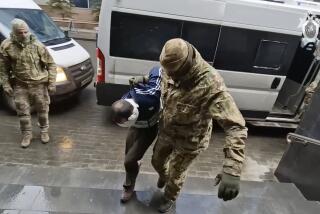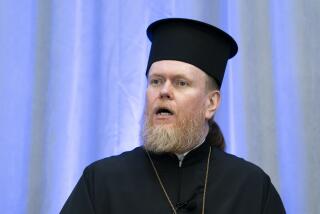Fearful Christians and Jews Leaving Troubled Soviet Tadzhikistan : Exodus: The region’s long-oppressed Islamic majority is asserting its newfound political and religious power.
- Share via
DUSHANBE, Soviet Union — Under the gold onion domes and Byzantine crosses of St. Nikolai’s Russian Orthodox Church, Father Nikolai Rybchinski had a full day on a recent Sunday, reading the Gospel and performing two funerals and two weddings, complete with jeweled gold crowns held above the heads of the bride and groom.
He also took time to chat with most members of his dwindling congregation.
Just across town, on the Jewish Sabbath the previous day, Rabbi Eliov Ben-Efraim had a similar schedule--reading the 300-year-old Torah in fluent Hebrew and praying for the ill, the newly married, the newborn and the dead.
Ben-Efraim began his service with a special prayer for the safety, prosperity and health of a large Jewish family that is leaving Dushanbe after many generations.
Tens of thousands of religious migrants, Christians and Jews alike, are fleeing the deeply troubled Soviet Central Asian republic of Tadzhikistan, where a long-oppressed Islamic majority is increasingly asserting its newfound political and religious power.
Taken together, the Jewish and Christian flight from a perceived common enemy is becoming an unrivaled modern-day exodus.
The flight is bringing to a close a rare, if little-known, chapter of history in which Jews, Christians and Muslims have lived together in peace for nearly a century.
It may well have been the iron fist of communism that kept the peace for so long. Moscow’s Draconian anti-religion campaign included the herding of pigs into mosques, the burning of synagogues and the conversion of grand Orthodox churches into grain depots and waste-disposal sites.
But it also brought together such men as Rybchinski, Ben-Efraim and the republic’s powerful Muslim leader, Qazi Akhbar Turadzhonzada. It forced their congregations to live, work and eat together as brothers, if only in misery.
In the five years since Soviet President Mikhail S. Gorbachev liberated all religions, Dushanbe was transformed into a mini-Jerusalem of tranquillity, where the muezzin’s wailing call to Islam’s Friday prayers melted into Saturday’s Hebrew celebration of the Sabbath and finally, on Sunday, Rybchinski’s chants.
Now the experiment is all but over. Tadzhikistan’s era of religious openness is giving way to something less tolerant.
It is not as if Tadzhikistan, which has declared its independence from the Soviet Union, has already converted itself into an Islamic republic in the mold of, say, Iran. In fact, when its Communist leadership seized power Sept. 23, the coup had the support of most Russians, who constitute the bulk of the Christian population, and Jews.
And Muslim leader Qazi Akhbar, who has the unwavering support of at least three-fourths of the republic’s 5.1 million people, ceremoniously withdrew his candidacy for president of Tadzhikistan as symbolic proof of his public commitment to secular democracy.
But the republic’s Party of Islamic Revival has launched an increasingly successful protest vigil in the city’s downtown square, demanding that the Communists in the adjacent Parliament building hand back the reins of government.
Most of the city’s senior mullahs indicate that, in a republic where as many as 90% of all citizens are Muslims, democratic rule necessarily means Islamic rule.
To many analysts, the orderly exodus of the Russian and Jewish doctors, technocrats, engineers, professors and scientists portends a newly independent nation that will backslide into an almost medieval era of Islamic rule.
“What concerns me most about this mass migration of Russians and other non-Tadzhiks is they have been working here in all the key positions like mining, a hydroelectric plant and practically all the major factories for very small salaries,” said Lakim Kaioumov, the republic’s foreign minister.
“We have declared ourselves independent now, so when they leave, we will have to draw them back as very costly foreign experts,” Kaioumov said.
At the heart of the exodus is fear, which was present in abundance at both St. Nikolai’s Church and the Synagogue of Dushanbe.
“Of course, I want only peace. We are all different religions, but we have only one God,” said Valentina Stepanova, an elderly parishioner at St. Nikolai’s and one of thousands of Russians who were forced to migrate here from an ancestral home in the Ukraine when their villages were occupied and burned during World War II.
“But the one thing I fear most is that blood will flow from here. . . . I am 78 years old, and I have no place to go. If they (the Muslims) permit me, I will stay here.”
Marina Khuzenny and her husband, Yuri, 32, have decided that they will not. After standing in a long line to buy prayer candles at St. Nikolai’s, Marina, a computer programmer by training, explained why they are committed to migrating to America.
“I’m afraid,” she said flatly. She described a meeting the previous week of war veterans searching for a solution to the standoff between the Communist coup leaders and the Muslim-led protesters.
“Suddenly a bunch of Tadzhiks burst in,” she said. “They seemed drunk or stoned, and one of them said, ‘Why are you here? Go to the square!’ Then they shouted, ‘Pity we didn’t kill all of you in February.’ ”
In February, 1990, many of Tadzhikistan’s Russians and Jews decided it was time to get out. During that month, mobs of Tadzhiks, reacting to rumors that immigrants were to receive new benefits, went on a rampage, attacking non-Tadzhiks throughout Dushanbe. At least 100 people were killed.
Religious leaders such as Qazi Akhbar, Rybchinski and Ben-Efraim have met frequently to seek ways to foster peace. At the grass-roots level, however, tension between the communities has left many neighborhoods outside Dushanbe virtually segregated.
Even the leaders of Dushanbe’s minority religious communities are pulling up stakes. Nariyev Abramov, former head of the Jewish community, is leaving for New York.
Across town at the Russian Orthodox church, Father Rybchinski has no such intention of bailing out.
The 52-year-old priest explained that he spent his first 15 years after graduation from the seminary as a volunteer frontier priest in remote Siberia. He came to Dushanbe six years ago.
When asked whether all Russians eventually will leave the republic, Rybchinski replied: “I cannot answer this definitely. The Soviet Union has broken apart, and if the Russian Republic establishes itself as a strong, healthy state, then most all of the Russians will go there to settle. It will be a better life for them there than here.”
More to Read
Sign up for Essential California
The most important California stories and recommendations in your inbox every morning.
You may occasionally receive promotional content from the Los Angeles Times.













